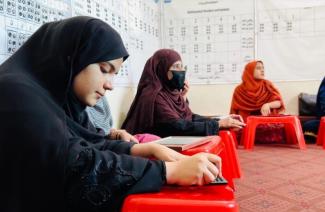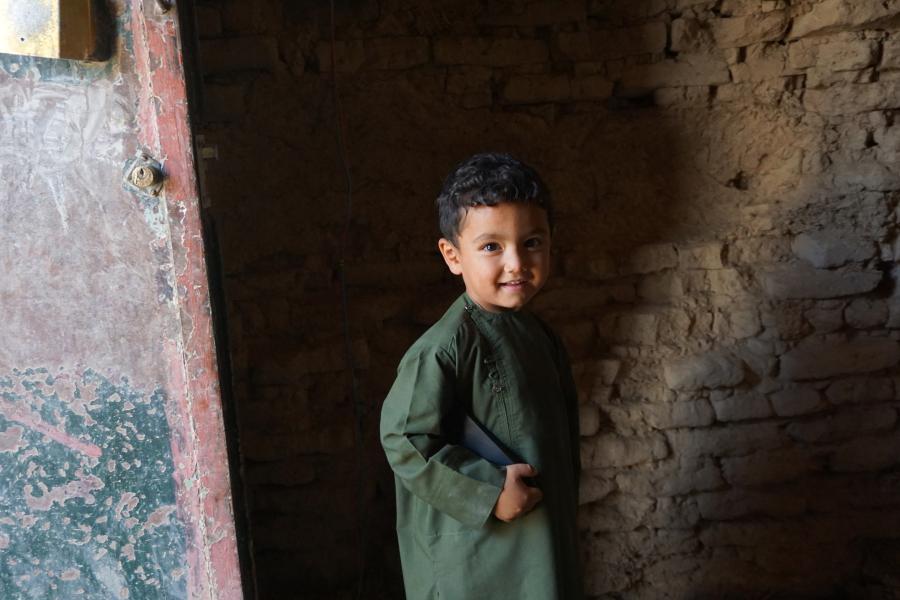Population figures | 2021 - 2025
2025 situation overview
Afghanistan remains one of the world’s most urgent crises. Human rights violations and abuses, economic instability, acute food insecurity and natural disasters are likely to threaten regional stability well into 2025.
While overall security has improved and previously inaccessible areas are now reachable in Afghanistan, significant challenges persist. This is especially true for women and girls, whose rights have been further restricted by a new morality law that codifies already repressive decrees by the de facto authorities, barring them from schools, universities, workplaces and public spaces. Many recent returnees and those still displaced within Afghanistan are vulnerable and desperately need UNHCR’s support. UNHCR is determined to stay and deliver critical assistance, while upholding the highest standards of accountability and transparency in the use of donor funding.
To address critical humanitarian and development needs and restore stability, sustained and substantial support is required. At the same time, greater responsibility-sharing by the international community will be essential to meet the growing needs, enhance conditions for voluntary return, and scale up strategic investments in resilience-building and stabilization programmes to prevent further displacement.
In 2025, UNHCR will deliver critical protection in Afghanistan to refugee returnees and internally displaced people, while providing access to basic services, sustainable shelter and housing solutions, and livelihoods with a focus on women and girls. UNHCR will continue to deliver assistance for humanitarian and basic human needs in a principled way, and advocate for the uninterrupted and non-discriminatory delivery of aid including by women for women and girls. To transform return into a force for stability, peace and hope, UNHCR is re-imagining community- and area-based investments in the prioritized areas of return and reintegration.
Subject to funding availability, it will provide cash assistance to 110,000 returnees, allowing them to prioritize their needs in a dignified manner while positioning this support as a key instrument for durable solutions. 30,000 IDPs and returnees will benefit from technical, vocational and education training designed to promote self-reliance, foster economic reintegration and mitigate economic shocks.
It will advance priorities in the recalibrated two-year inter-agency Refugee Response Plan (2024 – 2025) for the Afghanistan situation to support refugees and host communities in longer-term resilience, inclusion and solutions in the Islamic Republics of Iran and Pakistan, while remaining agile and responsive to the unpredictable situation inside Afghanistan.
Amid deepening hardship for already vulnerable Afghans in the Islamic Republics of Iran and Pakistan, which have generously provided hospitality for over 40 years, UNHCR will bolster efforts towards longer-term solutions for Afghans and support for their host communities. In the Islamic Republic of Iran, UNHCR will support the cost of secondary and tertiary health care insurance for over 300,000 refugees and asylum-seekers and the construction and rehabilitation of 200 health posts located in refugee hosting areas and refugee settlements. In the Islamic Republic of Pakistan, UNHCR will support the enrolment of 60,000 refugee children in primary and secondary education within the refugee villages.
UNHCR will also seek to leverage its influence in an already complex protection space by advocating against the involuntary return of Afghans, in view of its non-return advisory and the likely continuation of cross-border flows out of the country due to the increasingly restrictive laws imposed by the de facto authorities in Afghanistan. It will call for safe and voluntary returns and redouble efforts aimed at creating conditions conducive for returns, paving the way for sustainable voluntary returns in the future. In tandem, UNHCR will apply a whole-of-route approach to reduce harm along the routes taken by Afghan refugees, create alternatives to dangerous journeys, and support States in strengthening asylum capacity and managing mixed movements effectively.
UNHCR will drive forward the commitments made under the ReSolve multi-stakeholder pledge for resilience and solutions at the 2023 Global Refugee Forum. Coordinated through the Solutions Strategy for Afghan Refugees Support Platform, this initiative will play an important role in bolstering critical support and aligning international efforts to meet the needs of affected populations.
UNHCR will advance a sustainable responses approach and diversify partnerships with development actors and the private sector wherever possible so that its activities support protection and solutions, particularly for women and girls, while also promoting self-reliance, resilience and integrated humanitarian, development and peacebuilding efforts. With over half a million Afghan refugees projected to need resettlement in 2025, UNHCR will continue to scale up resettlement efforts for Afghans hosted across the region, particularly in the Islamic Republics of Iran and Pakistan. This approach seeks to create avenues for advocacy and engagement on broader protection issues while expanding access to skills-based complementary pathways in third countries, including education, labour mobility, family reunification and private sponsorship.
With climate emergency disproportionately impacting the region – particularly fragile countries with high vulnerabilities and limited coping mechanisms – UNHCR will prioritize integrating climate adaptation and resilience-building into its response to address the growing humanitarian needs in 2025.
Visually impaired women find hope in eastern Afghanistan
By Faramarz Barzin in Samarkhel, Afghanistan
Inside a small, makeshift classroom in a village in Nangahar Province in eastern Afghanistan, a group of blind young women are gathered for a lesson in communications. Socially isolated and frequently physically and psychologically abused, women who are visually impaired in Afghanistan spend most of their lives behind closed doors, denied the opportunity to go to school, learn life skills, or start a family.
Read the story










